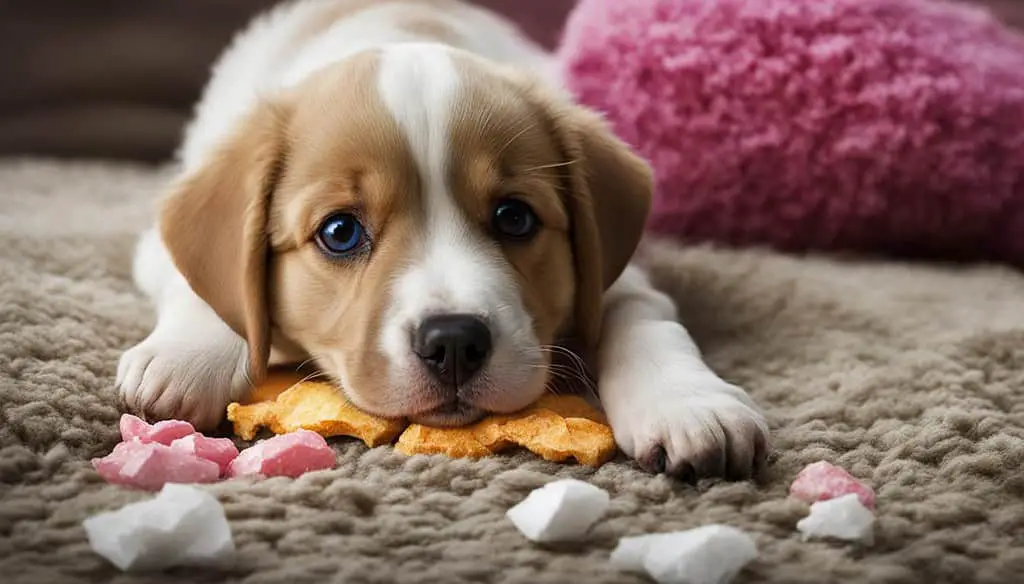Is It Dangerous for Dogs to Eat Puppy Pads?

As the holiday season approaches, your home becomes a wonderland filled with decorations and new items. Yet, in the midst of all the festivities, it’s crucial to remember the health and safety of your pets.
You may have trained your companion with the help of puppy pads, yet, the question surfaces – is it dangerous for dogs to eat puppy pads?
The concern is not unjustified; there are indeed potential risks for dogs if they ingest these training aids.
Understanding the health risks of dogs eating puppy pads not only helps in preventing potential emergencies but also in safeguarding the overall well-being of your pet. From possible toxicity to physical harm, the harmful effects of dogs ingesting puppy pads should not be overlooked.
Are you aware of what makes these pads dangerous, or the signs that your dog may be in distress from consuming them? Can puppy pads harm dogs in ways that necessitate an immediate visit to the vet?
Let’s dive into what makes these seemingly benign items a hidden hazard and how you can protect your loyal companion.
Key Takeaways
- Understanding the dangers associated with dogs consuming puppy pads is crucial for pet safety.
- Puppy pads may contain harmful chemical substances, posing health risks of dogs eating puppy pads.
- Being proactive and monitoring your dog can prevent them from ingesting non-edible items.
- Immediate veterinary attention is necessary if you suspect your dog has eaten a puppy pad.
- Alternative chewing options should be provided to satisfy your dog’s natural instincts.
- Recognizing distress signs post-ingestion could be lifesaving for your dog.
- Regular training and safe disposal of puppy pads can help in reducing the risks.
Understanding Why Dogs Chew on Puppy Pads
As a caring pet parent, it’s crucial to understand the root causes of why your canine friend might find puppy pads an appealing chew toy.
While it may seem harmless, the dangers of dogs eating puppy pads are very real. From safety concerns for dogs eating puppy pads to the severe consequences of dogs chewing on puppy pads, there are several reasons you should discourage your pets from this behavior – all for their health and wellbeing.

Identifying the Instinctual Behaviors Behind Chewing
Dogs often exhibit instinctual behaviors that can lead them to chew on various objects, including puppy pads.
Chewing can aid in maintaining dental health and keeping jaws strong.
However, it’s important to provide safer alternatives than allowing them to eat puppy pads, which are not designed for consumption and could lead to health issues.
Separation Anxiety and Boredom: The Psychological Factors
Psychological factors such as separation anxiety and boredom also play a significant role in why dogs may gravitate towards chewing on puppy pads.
The absence of stimulation or companionship could trigger your dog’s urge to chew as a coping mechanism.
Understanding these psychological triggers is critical in taking steps to mitigate the puppy pads and dogs dilemma by offering suitable mental and physical enrichment activities.
Teething in Puppies: A Natural Urge to Gnaw
For younger dogs, especially puppies, teething is a natural part of their growth, and gnawing on objects helps alleviate the discomfort associated with emerging teeth.
During this stage, it is especially important to monitor and guide their chewing habits to prevent them from choosing inappropriate items like puppy pads.
| Behavioral Cause | Danger | Safe Alternatives |
|---|---|---|
| Instinctual Chewing | Obstruction risks from ingested materials | Chew toys approved by veterinarians |
| Separation Anxiety | Accidental ingestion leading to potential poisoning | Interactive toys, puzzle feeders |
| Boredom | Dental issues from chewing non-edible fabrics | Regular play and exercise sessions |
| Teething | Toxic exposure from materials in puppy pads | Teething toys specifically designed for puppies |
The Composition of Puppy Pads and Potential Toxins
As a responsible pet owner, you’re likely aware of the convenience that puppy pads offer, especially during the house training stage. However, have you ever considered what puppy pads are made of and whether they can pose health risks to your dog?
It’s crucial to understand the harmful effects of eating puppy pads and the potential dangers of dogs chewing puppy pads.
Let’s delve into what constitutes these absorbent materials and why puppy pad ingestion in dogs could lead to serious health problems.

Primarily, puppy pads are designed to be highly absorbent.
This is achieved through the use of super-absorbent polymers (SAP), which are the same materials found in diapers. While these polymers are great at soaking up liquids, they can expand to many times their original size if ingested, which may lead to internal blockages—a serious health concern for your furry friend.
Besides SAP, the outer layers of the pads often contain plastics and adhesives, which can be toxic effects of a dog consuming puppy pads.
Although marketed as ‘pet-safe,’ these materials are not meant for digestion and could cause gastrointestinal irritation or more severe issues. So, the question lingers: can dogs get sick from eating puppy pads?
The answer is unequivocally yes.
The following table outlines the components commonly found in puppy pads and the risks of dogs consuming puppy pads:
| Component | Description | Potential Risk |
|---|---|---|
| Super-Absorbent Polymer (SAP) | SAPs are used to absorb liquids and lock them away. | Can swell inside a dog’s digestive system leading to blockages. |
| Plastics and Adhesives | Used in the backing to prevent leaks and keep the pad in place. | May cause choking or contain toxins harmful to your dog’s health. |
| Dyes and Fragrances | Added for aesthetic appeal or to mask odors. | Potential to cause allergic reactions or chemical toxicity. |
Keep in mind, that while the pads are essential for puppy potty training, their composition makes them unsuitable for canine consumption.
If you’ve noticed your dog exhibiting a propensity for chewing puppy pads, an immediate intervention and alternative solutions are required to avoid the onset of any toxic effects of dog consuming puppy pads.
Always monitor your pet during their use of puppy pads, and provide plenty of chew toys that are safe and specifically designed for dogs to fulfill their gnawing instincts.
If you suspect your dog has ingested part of a puppy pad, contact your veterinarian promptly. Remember, educating yourself about these potential hazards is the first step in protecting your beloved pet’s health and well-being.
Health Implications of Dogs Consuming Puppy Pads
As a devoted pet owner, you’re always vigilant about what your dog consumes.
The potential harm from dogs ingesting puppy pads is a serious concern that demands attention and knowledge.
Understanding the risks and complications of dogs eating puppy pads is essential for maintaining your furry friend’s health and happiness.
Internal Blockages and Their Dangerous Complications
Dog owners may not realize the severity of puppy pad ingestion dangers in dogs.
When a dog consumes substantial parts of a puppy pad, they risk developing an intestinal obstruction.
This blockage can lead to life-threatening complications if not promptly addressed. Signs of internal blockages include vomiting, lethargy, abdominal pain, and changes in bowel movements.
Chemical Risks: Ingesting Polymer and Other Substances
Puppy pads contain superabsorbent polymers, which can expand inside your dog’s digestive system, leading to dehydration and possible toxicity.
The chemical components in these pads are not meant for ingestion and can cause serious internal harm.
Spotting Symptoms of Distress in Your Dog
Recognizing the symptoms of distress early can be life-saving if your dog ingests a puppy pad.
Keep an eye out for excessive drooling, choking, difficulty breathing, or a sudden change in behavior.
These signs may indicate that your dog has ingested part of a puppy pad and needs immediate veterinary care.
In the unfortunate event that your dog ingests a puppy pad, it’s crucial to understand the hazards of puppy pads ingestion.
Below is a detailed table showcasing the various symptoms that may arise and the corresponding actions you should take:
| Symptoms of Ingestion | Immediate Actions | Long-Term Considerations |
|---|---|---|
| Gastrointestinal blockage | Contact your vet immediately; surgery may be required. | Monitor daily habits and provide appropriate chew toys. |
| Chemical exposure symptoms (vomiting, diarrhea) | Consult with a vet about the risks of chemical toxicity. | Keep puppy pads out of reach and secure garbage bins. |
| Behavioral changes (anxiety, distress) | Observe and report these changes to your veterinarian. | Engage your dog in regular play to discourage chewing on non-food items. |
Being proactive in preventing your dogs from accessing and eating puppy pads is the best course of action.
Secure your puppy pads and observe your pet’s environment for any hazards that could lead to these risky behaviors.
Timely action and education about the risks of puppy pad ingestion can safeguard your beloved canine’s well-being.
Is It Dangerous for Dogs to Eat Puppy Pads
As a diligent dog owner, it’s essential to understand the health concerns associated with your furry friend possibly munching on puppy pads.
These seemingly harmless training aids can turn into serious hazards, leading to unintended health implications for your canine companion.
Deciphering the risks and taking proactive steps toward prevention are key to ensuring the safety and well-being of your beloved pet.
Safety Concerns for Dogs Eating Puppy Pads
The health risks and consequences of dogs eating puppy pads cannot be overstated. Ingesting these items can cause gastrointestinal obstruction—a dangerous and potentially life-threatening condition.
Signs that your dog is struggling with this include vomiting, lack of appetite, and abdominal pain.
Immediate veterinary attention becomes essential in such cases, highlighting the critical nature of preventing such incidents in the first place.
Can Puppies Get Sick from Eating Puppy Pads?
Indeed, puppies and adult dogs alike can get very sick from ingesting puppy pads.
The materials and chemicals within, including absorbent polymers, can lead to both toxicity and physical harm.
Depending on the amount consumed, symptoms can range from mild discomfort to severe distress, emphasizing the importance of keeping these products out of reach of curious canines.
Preventative Measures to Protect Your Pet
It’s far better to preemptively prevent your dogs from eating puppy pads than to deal with the consequences. Simple steps can be taken, such as:
- Providing plenty of appropriate chew toys to keep their mouths occupied and away from harmful objects.
- Ensuring close supervision when puppy pads are accessible, especially during the house-training phase.
- Training your dog to understand “leave it” or similar commands to avoid undesirable chewing behavior.
Implementing these measures can go a long way in maintaining the health and happiness of your four-legged family member.
Conclusion
As we wrap up our discussion on the dangers posed by dogs consuming puppy pads, it’s crucial to acknowledge the veterinary concerns about dogs eating puppy pads.
These seemingly harmless training aids can indeed be fraught with health hazards if ingested. While you might consider them a convenient solution for house training, the question of are puppy pads toxic for dogs cannot be dismissed lightly.
Confronting the potential health risks for dogs consuming puppy pads, you, as a responsible pet owner, must take vigilant steps to prevent your canine from mistaking these pads as chew toys.
It’s not just about averting an undesirable behavior; it’s ensuring the continued health and vitality of your beloved companion.
The consequences of dogs ingesting puppy pads range from mild to severe, hence why vet advice on dogs consuming puppy pads is to seek immediate professional help if an incident occurs.
Ultimately, safeguarding your dog’s well-being entails proactive education on the possible dangers and implementing preventative strategies.
Being well-informed on these issues will help you in making the best decisions for your pet’s safety. Remember, their health and happiness lie in your hands, and with the right measures, you can provide them with a secure and loving environment.
FAQ
Is it dangerous for dogs to eat puppy pads?
Yes, it can be dangerous for dogs to eat puppy pads. They pose potential risks of causing internal blockages and may contain harmful chemicals which can lead to health issues if ingested.
What are the instinctual behaviors behind dogs chewing on puppy pads?
Dogs may chew on puppy pads due to instinctual behaviors like exploratory chewing, or as a way to relieve stress and discomfort, especially in puppies who are teething.
Can separation anxiety and boredom make dogs chew on puppy pads?
Absolutely. Dogs that experience separation anxiety or boredom may chew on puppy pads as a coping mechanism or to keep themselves occupied.
Are the materials in puppy pads toxic to dogs?
Puppy pads can contain materials that are toxic if ingested by dogs. They often include super absorbent polymers and plastic components which can be harmful.
What are the health implications of dogs consuming puppy pads?
Ingesting puppy pads can lead to health implications such as gastrointestinal blockages, potential chemical toxicity, and the need for surgical intervention in severe cases.
Can puppies get sick from eating puppy pads?
Yes, puppies can get sick from eating puppy pads. Consuming non-edible materials like puppy pads can cause vomiting, diarrhea, and in more serious instances, obstruction or intoxication.
How can I prevent my dog from eating puppy pads?
Preventing your dog from eating puppy pads includes providing proper supervision, offering appropriate chew toys, dog-proofing your home, and training your dog to avoid chewing on inappropriate items.
What should I do if my dog ingests part of a puppy pad?
If your dog ingests part of a puppy pad, it’s important to consult your veterinarian immediately. They can assess your dog’s condition and provide necessary treatment, which may include inducing vomiting or surgery.
